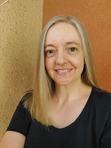Jessica Knauss's Blog, page 44
September 13, 2012
Happy Anniversary, Year Three
I can just about count the years I've been with my husband by how many different states we've lived in. Today marks the third anniversary, and despite the other troubles we've been having, our love is still fresh.
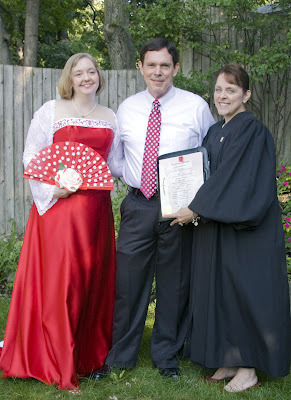 Here's a picture from that effervescent day with the officiant, Carol Merletti, who, I might add, has made the Best of Boston list every year since she married us. Hooray!
Here's a picture from that effervescent day with the officiant, Carol Merletti, who, I might add, has made the Best of Boston list every year since she married us. Hooray!
We met on a 13th, and married on a 13th. Just in time for this third anniversary, I have 113 Google followers! Lucky 13!
And because my guy loves Manolo García almost as much as I do, here's one of his finest love songs.

 Here's a picture from that effervescent day with the officiant, Carol Merletti, who, I might add, has made the Best of Boston list every year since she married us. Hooray!
Here's a picture from that effervescent day with the officiant, Carol Merletti, who, I might add, has made the Best of Boston list every year since she married us. Hooray!We met on a 13th, and married on a 13th. Just in time for this third anniversary, I have 113 Google followers! Lucky 13!
And because my guy loves Manolo García almost as much as I do, here's one of his finest love songs.
Published on September 13, 2012 00:37
September 12, 2012
A Litmus Test for Writers: Yes, I Have to Write!
Writing is not for sissies. Professor Darby Sanders gave one of the presentations at the SCAD writers' conference the weekend of the Decatur Book Festival (August 31st). Instead of giving us an information dump (which I thoroughly enjoy and benefit from as well), he presented us with a series of questions meant to weed out people who might have come to the event thinking that writing was a career option for anyone with a vague idea. Sorry, it's not. It's hard and it takes more dedication than I would be willing to give to anything else in the world (except my beloved husband).
The questions (modified and condensed by my scribbled notes) follow, with my honest answers. A sort of self-interview for those of you who are curious about what's important to me.
1. Should you write what you know or what you love?
Fortunately, we can research even while writing, so the draw toward writing what I love doesn't result in lower quality. And there's really no reason the two can't be the same thing.
2. What part of your body do you use to write?
The right answer here is anything "not with the intellect." The question put a picture in my head of my hands at the keyboard, the fingers furiously gesticulating to express the dictates of a mysterious inspiration. So I suppose I write with my "muse," if that's considered a body part.
3. Which reveals more about the human experience, fiction or nonfiction?
Duh. Fiction can explore the motivations and humanity of actions while nonfiction has traditionally kept to describing merely the actions. On the logic that what people felt while the actions took place is also a fact (even if a less objective one), creative nonfiction has been blurring the dichotomy. But if we're sticking to strict definitions, fiction has infinite capabilities to explore the human condition while nonfiction is limited by empirical experience.
4. Are you in it for the story or yourself?
I write the stories out of a felt need to give a body in the shape of words to these formless gifts that come to me from the cosmos. I know that sounds too otherworldly. To answer the question, story is everything and I don't let my ego get in the way. This self-effacement makes it difficult to actually SELL the stories, since the media is perversely focused on personality, but these questions are about writing, not the aftermath.
5. Do you like to talk or do you have something to say?
I'm an introvert. I only say something if there's something to say, genuinely. Again, for the selling part, I'm going to have to find some extra charisma under a rock somewhere, but at least my writing doesn't have a lot of extra verbiage or ego.
6. Are you cynical or optimistic about humans? Are you interested in them, discouraged by them, or afraid of them? Do you believe people can change?
It's imperative to be fascinated by humans in order to engage in storytelling. Otherwise there's no point at all. There's equally no point if people don't change -- where's the story in that? I'm mostly optimistic, but this question made me think about my current WIP, The Seven Noble Knights of Lara. The original story could be seen as pretty darn pessimistic. There's a risk that I'll try to salvage that as I approach the ending, and I sure hope it turns out believable! Cross your fingers for me!
7. Do you have to write? Do you have to write well?
I absolutely have to write. I don't know what life would be without writing. If no one wants to read it, I can go back to just writing for myself, but I do also feel a need to write well. Writing well increases the quality of life and flatters the language as well as making it less embarrassing to show to others and perhaps sell to them. If I can get my life stabilized, I have a few ideas, aside from writing every day and reading good books, to continue to improve my writing. Wish me luck with that, too.
8. Can you finish or just begin?
I've completed many stories of which I'm proud. Finishing weighs heavy on my mind now as I move into the final chapters of SNKL. Although it's scary and I do tend to have more ideas than I can possibly carry out in several lifetimes, I have to believe that finishing is on the agenda.
9. Would you rather succeed at something you hate or fail at something you love?
There is so much more quality in failing at something you love that I don't even know if I would be capable of succeeding at something I disliked. In other words, give me writing. I'll write and I may well fail, but the love I bring into the world while failing is its own contribution.

The questions (modified and condensed by my scribbled notes) follow, with my honest answers. A sort of self-interview for those of you who are curious about what's important to me.
1. Should you write what you know or what you love?
Fortunately, we can research even while writing, so the draw toward writing what I love doesn't result in lower quality. And there's really no reason the two can't be the same thing.
2. What part of your body do you use to write?
The right answer here is anything "not with the intellect." The question put a picture in my head of my hands at the keyboard, the fingers furiously gesticulating to express the dictates of a mysterious inspiration. So I suppose I write with my "muse," if that's considered a body part.
3. Which reveals more about the human experience, fiction or nonfiction?
Duh. Fiction can explore the motivations and humanity of actions while nonfiction has traditionally kept to describing merely the actions. On the logic that what people felt while the actions took place is also a fact (even if a less objective one), creative nonfiction has been blurring the dichotomy. But if we're sticking to strict definitions, fiction has infinite capabilities to explore the human condition while nonfiction is limited by empirical experience.
4. Are you in it for the story or yourself?
I write the stories out of a felt need to give a body in the shape of words to these formless gifts that come to me from the cosmos. I know that sounds too otherworldly. To answer the question, story is everything and I don't let my ego get in the way. This self-effacement makes it difficult to actually SELL the stories, since the media is perversely focused on personality, but these questions are about writing, not the aftermath.
5. Do you like to talk or do you have something to say?
I'm an introvert. I only say something if there's something to say, genuinely. Again, for the selling part, I'm going to have to find some extra charisma under a rock somewhere, but at least my writing doesn't have a lot of extra verbiage or ego.
6. Are you cynical or optimistic about humans? Are you interested in them, discouraged by them, or afraid of them? Do you believe people can change?
It's imperative to be fascinated by humans in order to engage in storytelling. Otherwise there's no point at all. There's equally no point if people don't change -- where's the story in that? I'm mostly optimistic, but this question made me think about my current WIP, The Seven Noble Knights of Lara. The original story could be seen as pretty darn pessimistic. There's a risk that I'll try to salvage that as I approach the ending, and I sure hope it turns out believable! Cross your fingers for me!
7. Do you have to write? Do you have to write well?
I absolutely have to write. I don't know what life would be without writing. If no one wants to read it, I can go back to just writing for myself, but I do also feel a need to write well. Writing well increases the quality of life and flatters the language as well as making it less embarrassing to show to others and perhaps sell to them. If I can get my life stabilized, I have a few ideas, aside from writing every day and reading good books, to continue to improve my writing. Wish me luck with that, too.
8. Can you finish or just begin?
I've completed many stories of which I'm proud. Finishing weighs heavy on my mind now as I move into the final chapters of SNKL. Although it's scary and I do tend to have more ideas than I can possibly carry out in several lifetimes, I have to believe that finishing is on the agenda.
9. Would you rather succeed at something you hate or fail at something you love?
There is so much more quality in failing at something you love that I don't even know if I would be capable of succeeding at something I disliked. In other words, give me writing. I'll write and I may well fail, but the love I bring into the world while failing is its own contribution.
Published on September 12, 2012 00:10
September 10, 2012
Guest Post: Rooting for the Underdog by J. Bridger
J. Bridger presented the book Shifted Perspective to me with the tagline "What would you do with what you believed was the world's lamest ability?" This resonated with me because I'd been wondering lately about all the characters who are incredibly special. After all, if everyone is special, no one is. There have to be a lot of other characters who are not so special to support these all these people with amazing abilities and powers. What about their story? I have a novel on the back burner about just that subject, but J. Bridger's Shifted Perspective comes out today, so I was keen to ask what motivated the author to write a book about someone who is definitely
not
the Alpha Dog.
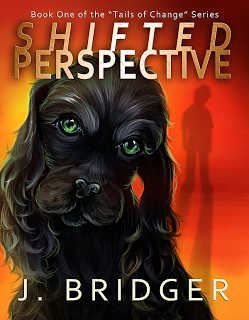
Why I Chose a “Loser” Character
I love a Chosen One. I do. I was an obsessive Buffy fan for years, and of course I’ve read Harry Potter and watched the films. It’s cool to see someone who is the in-charge type, the one who has epic prophecies all about them. You want to imagine yourself as the best, the enhanced warrior or The Boy Who Lived and is destined to stop evil. Who wouldn’t want to daydream about secretly being that special?
That said, I wanted to point out two things about Buffy and Harry. Buffy subverted the Chosen One archetype by sharing her power with every potential slayer in the series’ finale, thus creating a group of possibly thousands of other heroines out there with shared strength. Similarly, Order of the Phoenix started really creating the idea that Harry was important because Voldemort made him so in his own mind. After all, wasn’t Neville, who eventually destroys Nagini, the final horcrux, also born in July? It’s ironic to me that two of the most famous “special heroes” in recent pop culture either decided to share power or might not have been so fated overall.
This brings me to my own story, Shifted Perspective. I made the choice here not to have Caleb Byrne be anything special. He’s a late bloomer at best and never shape shifted until he was seventeen, which is far, far older than the average canine shifter or werewolf. Even as a shape shifter, all he can become is a Cocker Spaniel, which isn’t powerful or dangerous. Often, Caleb laments that couldn’t he at least have been a Doberman or a German shepherd. You know, something with bite?
So why would I go this route when the story could have had the Alpha’s son as the protagonist or someone in the pack who’s top dog? Well, I think that I wanted to do something a bit different and also subversive in the same way that Buffy and Harry turned out to be. I’ve never been much of a fatalist. I think people end up making their own destinies and all the prophecies in the world don’t mean a thing if you work hard enough to change them. Besides, we always root for the underdog and want to see him succeed. I hope readers feel that way about Caleb, too.
-- J. Bridger
Shifted Perspective is available at Amazon and Smashwords. Be sure to visit J. Bridger's blog for more about this unique series.

Why I Chose a “Loser” Character
I love a Chosen One. I do. I was an obsessive Buffy fan for years, and of course I’ve read Harry Potter and watched the films. It’s cool to see someone who is the in-charge type, the one who has epic prophecies all about them. You want to imagine yourself as the best, the enhanced warrior or The Boy Who Lived and is destined to stop evil. Who wouldn’t want to daydream about secretly being that special?
That said, I wanted to point out two things about Buffy and Harry. Buffy subverted the Chosen One archetype by sharing her power with every potential slayer in the series’ finale, thus creating a group of possibly thousands of other heroines out there with shared strength. Similarly, Order of the Phoenix started really creating the idea that Harry was important because Voldemort made him so in his own mind. After all, wasn’t Neville, who eventually destroys Nagini, the final horcrux, also born in July? It’s ironic to me that two of the most famous “special heroes” in recent pop culture either decided to share power or might not have been so fated overall.
This brings me to my own story, Shifted Perspective. I made the choice here not to have Caleb Byrne be anything special. He’s a late bloomer at best and never shape shifted until he was seventeen, which is far, far older than the average canine shifter or werewolf. Even as a shape shifter, all he can become is a Cocker Spaniel, which isn’t powerful or dangerous. Often, Caleb laments that couldn’t he at least have been a Doberman or a German shepherd. You know, something with bite?
So why would I go this route when the story could have had the Alpha’s son as the protagonist or someone in the pack who’s top dog? Well, I think that I wanted to do something a bit different and also subversive in the same way that Buffy and Harry turned out to be. I’ve never been much of a fatalist. I think people end up making their own destinies and all the prophecies in the world don’t mean a thing if you work hard enough to change them. Besides, we always root for the underdog and want to see him succeed. I hope readers feel that way about Caleb, too.
-- J. Bridger
Shifted Perspective is available at Amazon and Smashwords. Be sure to visit J. Bridger's blog for more about this unique series.
Published on September 10, 2012 00:43
September 8, 2012
Sweet Saturday Sample: Rhinos!
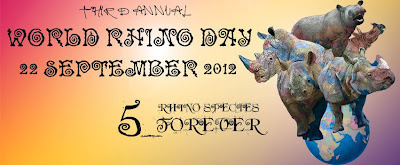 September 22 is World Rhino Day, so I thought I would provide you a sample from the story collection I've put together in honor of that.
September 22 is World Rhino Day, so I thought I would provide you a sample from the story collection I've put together in honor of that.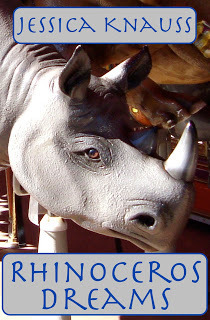 None of the stories have explicit material, though the real-life situation of rhinos is certainly disturbing.
None of the stories have explicit material, though the real-life situation of rhinos is certainly disturbing.The first story, a fun, surreal love story, was recently made available again in Jake's Monthly (read about it here). This excerpt is the opening from my beloved alternate reality piece, "Not Extinct Yet," published in this collection for the first time anywhere.
* * *
Suzanne came into the kitchen dressed for work in a sensible suit. With bitten-down fingernails, she had affixed a pin showing the two-horned face of an African rhinoceros, surrounded by a heart, to her lapel. “Hey,” said her husband Derek, rustling his daily news at the table. “The British are at it again.”Suzanne sighed. “Always with the sheep.”“Yep. Apparently, there’s a law for debate in Parliament this time.”“Not legalization?”“Marriage between human and ovine may soon be a reality! Get this.” He started to read aloud. “An anonymous source recounted his personal experience. ‘Miranda was out in the moor grazing with the rest of the flock when I looked deep into her eyes. It was love. We fell to talking and we’ve never been apart since.’ The Miranda in question gave no comment.”“Call me traditional, but there’s something not quite right about that,” said Suzanne as she buttered some toast.“Sure, she can talk, but does this guy let her? No. It’s the same old story. Control, control, control.” Derek crumpled the paper and took his plate to the sink.Suzanne kissed her husband. “All right, off to the university’s salt mines with you.”“You know he made up that name. Who ever heard of a sheep who called herself Miranda?”
* * *
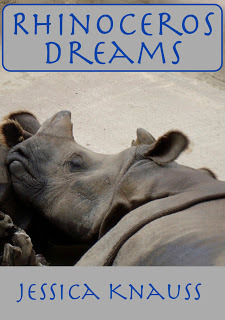 This collection is now available at Amazon and Smashwords. It's my first Smashwords title, but I think it formatted well. Let me know if not! And yes, it has two different covers. This one with the sleeping rhino won the votes on Facebook, but I liked the other one too much not to use it.
This collection is now available at Amazon and Smashwords. It's my first Smashwords title, but I think it formatted well. Let me know if not! And yes, it has two different covers. This one with the sleeping rhino won the votes on Facebook, but I liked the other one too much not to use it.Thanks for stopping by! I plan to celebrate World Rhino Day by writing more about this story, its inspiration and intent. For now, enjoy more Sweet Saturday Samples!
Published on September 08, 2012 00:22
September 7, 2012
Rhino Calendar to Support The Five Species
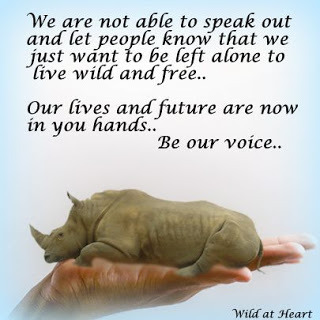
The International Rhino Keeper Association has put out a gorgeous rhino calendar for 2013 in support of all rhinos in general, but specifically to help the littlest ones, the Sumatran rhinos. Although they're the smallest in size among the five species of existing rhinos, Sumatran rhinos are the most direct descendants of the ancient wooly rhinoceros. They need our help because there are only about 100 of them left in the world.
Get your calendar here at a discount until World Rhino Day, September 22.
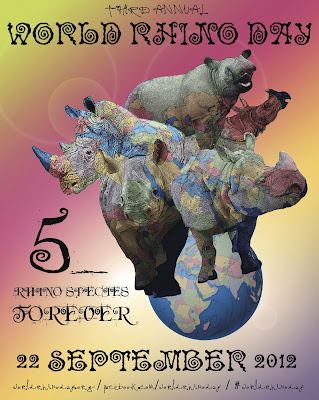
Published on September 07, 2012 00:30
September 5, 2012
Pictures from the Decatur Book Festival
Last Friday I had an amazing time at the writers' workshop at the Savannah College of Art and Design in conjunction with the Decatur Book Festival. The fun heated up on Saturday and Sunday but did not stop in spite of 90+ degrees, sun sun sun and humidity that must be felt to be believed.
 The Decatur Public Library (a lovely and welcoming bastion of literacy) was never far from the action.
The Decatur Public Library (a lovely and welcoming bastion of literacy) was never far from the action.
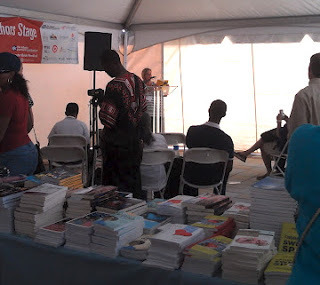 Lynn Garson reads from her new book,
Southern Vapors
, in the Emerging Authors Tent.
Lynn Garson reads from her new book,
Southern Vapors
, in the Emerging Authors Tent.
 Jane Austen discusses her life and writing with today's readers.
Jane Austen discusses her life and writing with today's readers.
 Jane Austen Then and Now booths and their thronging hordes
Jane Austen Then and Now booths and their thronging hordes
 Full of action, but mostly people in search of shade.
Full of action, but mostly people in search of shade.
 More amazing architecture as a backdrop and venue for the festivities
More amazing architecture as a backdrop and venue for the festivities
 Books, books, everywhere! What to do first?Thanks to all the organizers and authors and of course, the readers who made this incredible event possible.
Books, books, everywhere! What to do first?Thanks to all the organizers and authors and of course, the readers who made this incredible event possible.
On another note, September 22 is World Rhino Day! I hope to have something special to present to you for that special day.
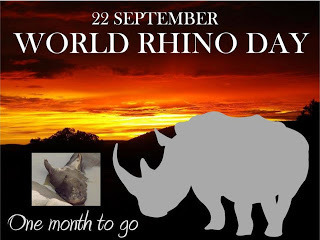

 The Decatur Public Library (a lovely and welcoming bastion of literacy) was never far from the action.
The Decatur Public Library (a lovely and welcoming bastion of literacy) was never far from the action. Lynn Garson reads from her new book,
Southern Vapors
, in the Emerging Authors Tent.
Lynn Garson reads from her new book,
Southern Vapors
, in the Emerging Authors Tent. Jane Austen discusses her life and writing with today's readers.
Jane Austen discusses her life and writing with today's readers.
 Jane Austen Then and Now booths and their thronging hordes
Jane Austen Then and Now booths and their thronging hordes
 Full of action, but mostly people in search of shade.
Full of action, but mostly people in search of shade.
 More amazing architecture as a backdrop and venue for the festivities
More amazing architecture as a backdrop and venue for the festivities
 Books, books, everywhere! What to do first?Thanks to all the organizers and authors and of course, the readers who made this incredible event possible.
Books, books, everywhere! What to do first?Thanks to all the organizers and authors and of course, the readers who made this incredible event possible.On another note, September 22 is World Rhino Day! I hope to have something special to present to you for that special day.

Published on September 05, 2012 00:15
September 3, 2012
Monstrous Beauty by Elizabeth Fama
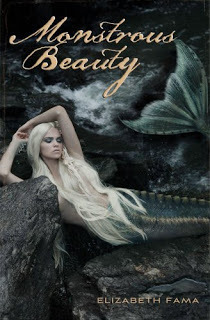 I suspected mermaids were the next wave in YA fantasy creatures, and Monstrous Beauty has proven that even if they aren't, they should be. Author Elizabeth Fama creates a well-defined mythos full of terror and the sorrow of never being able to love without tragic consequences. Many non-YA books wish they were as well conceived and constructed. Mermaids allow readers into the female side of the fantasy world in a way vampires and wizards have thus far been unable to do.
I suspected mermaids were the next wave in YA fantasy creatures, and Monstrous Beauty has proven that even if they aren't, they should be. Author Elizabeth Fama creates a well-defined mythos full of terror and the sorrow of never being able to love without tragic consequences. Many non-YA books wish they were as well conceived and constructed. Mermaids allow readers into the female side of the fantasy world in a way vampires and wizards have thus far been unable to do.The history of a place like Plymouth, Massachusetts, makes it the perfect setting for a book like this. I was skeptical when I first picked this story up, but the setting and the history-loving protagonist drew me in even more than the vivid descriptions and mysterious atmosphere.
The best feature of this novel is that the origin story is interspersed with present-day chapters, so the reader not only has time to care about both sets of characters, but also to enjoy an important dramatic irony by the middle of the story. The reader knows what Hester is looking for better than she does, but the complete sequence of events only becomes clear at the end, when Hester herself finds out the final pieces of the puzzle. It's masterfully done.
One sticking point for me was Hester's antique perception of love=marriage=babies. Perhaps I just can't sympathize, but it seemed like a weird leap to me, and her admission near the climax of the book that she's planning to never have children (in order to escape her family's curse) fell a little flat for me because it was only logical. In the end, I decided to forgive it because the century-long curse really doesn't have any effect unless the women are having babies. There is a rape in this book, which is necessary because it sets all the other elements in motion to create the curse. Without it, there's no story. Or, at least, there could have been a happier one. That doesn't make it less disturbing.
In spite of the intertwining stories, the novel is fast paced. Hard to put down, especially for readers who love the ancient lore of the sea.
Published on September 03, 2012 00:18
August 31, 2012
Big Weekend!
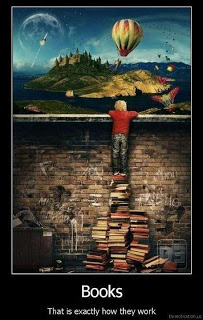
This weekend I'll be at the AJC Decatur Book Festival, hopefully doing some good schmoozing and definitely enjoying myself. See you there!
Published on August 31, 2012 00:35
August 29, 2012
Author Interview: Mik Everett
Today Mik Everett, author of the astonishingly uncategorizable Turtle, has stopped by to answer just a few of the burning questions I was left with when I finished the book.
JK: I'll start with the obvious. You seem pretty young to write with such verve. What are your literary influences?
ME: It seems fallacious to say that the biggest influence on my writing is life, because that really doesn't account for all the little discrepancies between different people's experiences in life. Two people in the same place at the same time have two different memories of an occurrence, no matter how similar their experience may be to an outside observer-- and that observer has a completely different perspective as well. I guess that perspective is the greatest influence on my writing. I like accounting for different points of view, telling stories from unusual perspectives, or even using writing to gain a sense of perspective. I find stories too unrealistic and bland when every character remembers and describes an unusual astrological event or even a simple argument with the same perspective.
JK: Writing from your own perspective about any family, but especially this one, is a truly bold decision. Does your family support your writing?
ME: Regarding Turtle, very little of my family knows that I wrote it. For reasons obvious if you've read even a synopsis of the book, I used a pseudonym and kept it secret from my family that I'd published it. I'd published a few short stories and I have a freelance writing job, but because my family doesn't know about Turtle, they're basically under the impression that I'm a no-account jobless dreamer dabbling in university courses and unsteady writing jobs. I'm okay with that. It sort of leaves me free to do what I want to do.
JK: I can understand how that freedom is necessary for you.
ME: My dad is the exception. He found a link to the Amazon page for Turtle in my byline on an article I'd written about, I don't know, bread or something. He bought the book. He called me after he read it. He kept repeating that it seemed to him I did a pretty good job of being accurate, but that someone reading it might wonder, "Where is this girl's father?" I didn't have a good response for him. I typed up our conversation-- my perspective of it-- right after I got off the phone, and I've thought about adding it as an epilogue to the book. It would add some information that I didn't know at the time of the publication of the book.
JK: Now that he mentions it, there was a distinct lack of a father figure in the book, so that epilogue could be interesting. What about the people in your daily life?
ME: I have, of course, marvelous support from what I truly consider my family-- my better half, John, and our two children. His son is just six months older than my daughter Sophie, and apart from the terror of raising two toddlers close enough to be twins, I have everything I could ever ask for in a family. Although, because John is a writer as well, we're not the sanest of families. I'm okay with that.
JK: How did you get started writing?
ME: I don't remember how I started writing. As a child-- I'm talking maybe three years old-- my mother would get tired of me asking her to spell words, so she'd tell me to go outside to play. Then I would just cover the driveway in chalk. I never stopped writing. I wrote backwards, I wrote in code. I covered the backs of envelopes and voided checks. Eventually I realized that wasn't going anywhere and I started putting stuff together to make stories. I have a freelance job writing humorous essays of the 'scathing' variety and cultural reviews for an online publication. I'm somewhat working on another novel. Sort of Through the Looking Glass, but with the plot of This Side of Paradise and with logical proofs instead of a chess game. I worked as a logic instructor at my university for a year, and I was overwhelmed by the desire to turn the algebra-like language of logic into a narrative. Don't expect it to be out for a few years, though.
JK: What can readers think about while they wait?
ME: My family is taking a tour of all the swirly highways that go around and up and down the mountains. We're camping at night, driving all day, and stopping at every retail space with a 'FOR RENT' sign. So far we've been charged by an elk, had all our food eaten by bears, made friends with a bike gang, etc. Once we complete our circuit, we're going to decide on a location and get the heck back to Kansas to bottle some beer that's currently fermenting in our basement. It's this black-as-black stout called Ink; the label is a squid reading a book. Let me back up. Our company is called Brainfood, and we're currently a brewery with a bottle that's combination literary magazine/ art exhibit. We're accepting submissions of flash fiction and artwork, which we use on our labels and on the cardboard six-packs. Once we find a suitable retail space, we're going to expand our wares to include books and art. Our goal is to provide retail space for independent authors and artists, and hopefully venue space for musicians as well.
JK: Thanks so much for these updates. Readers will have to wait with bated breath for such brilliant projects to take off. In the meantime, you can support both Mik's writing and her exciting bookstore, etc. project by picking up Turtle or by following @BrainfoodVenue on Twitter and submitting your flash fiction and poetry for the beer bottle labels.
JK: I'll start with the obvious. You seem pretty young to write with such verve. What are your literary influences?
ME: It seems fallacious to say that the biggest influence on my writing is life, because that really doesn't account for all the little discrepancies between different people's experiences in life. Two people in the same place at the same time have two different memories of an occurrence, no matter how similar their experience may be to an outside observer-- and that observer has a completely different perspective as well. I guess that perspective is the greatest influence on my writing. I like accounting for different points of view, telling stories from unusual perspectives, or even using writing to gain a sense of perspective. I find stories too unrealistic and bland when every character remembers and describes an unusual astrological event or even a simple argument with the same perspective.
JK: Writing from your own perspective about any family, but especially this one, is a truly bold decision. Does your family support your writing?
ME: Regarding Turtle, very little of my family knows that I wrote it. For reasons obvious if you've read even a synopsis of the book, I used a pseudonym and kept it secret from my family that I'd published it. I'd published a few short stories and I have a freelance writing job, but because my family doesn't know about Turtle, they're basically under the impression that I'm a no-account jobless dreamer dabbling in university courses and unsteady writing jobs. I'm okay with that. It sort of leaves me free to do what I want to do.
JK: I can understand how that freedom is necessary for you.
ME: My dad is the exception. He found a link to the Amazon page for Turtle in my byline on an article I'd written about, I don't know, bread or something. He bought the book. He called me after he read it. He kept repeating that it seemed to him I did a pretty good job of being accurate, but that someone reading it might wonder, "Where is this girl's father?" I didn't have a good response for him. I typed up our conversation-- my perspective of it-- right after I got off the phone, and I've thought about adding it as an epilogue to the book. It would add some information that I didn't know at the time of the publication of the book.
JK: Now that he mentions it, there was a distinct lack of a father figure in the book, so that epilogue could be interesting. What about the people in your daily life?
ME: I have, of course, marvelous support from what I truly consider my family-- my better half, John, and our two children. His son is just six months older than my daughter Sophie, and apart from the terror of raising two toddlers close enough to be twins, I have everything I could ever ask for in a family. Although, because John is a writer as well, we're not the sanest of families. I'm okay with that.
JK: How did you get started writing?
ME: I don't remember how I started writing. As a child-- I'm talking maybe three years old-- my mother would get tired of me asking her to spell words, so she'd tell me to go outside to play. Then I would just cover the driveway in chalk. I never stopped writing. I wrote backwards, I wrote in code. I covered the backs of envelopes and voided checks. Eventually I realized that wasn't going anywhere and I started putting stuff together to make stories. I have a freelance job writing humorous essays of the 'scathing' variety and cultural reviews for an online publication. I'm somewhat working on another novel. Sort of Through the Looking Glass, but with the plot of This Side of Paradise and with logical proofs instead of a chess game. I worked as a logic instructor at my university for a year, and I was overwhelmed by the desire to turn the algebra-like language of logic into a narrative. Don't expect it to be out for a few years, though.
JK: What can readers think about while they wait?
ME: My family is taking a tour of all the swirly highways that go around and up and down the mountains. We're camping at night, driving all day, and stopping at every retail space with a 'FOR RENT' sign. So far we've been charged by an elk, had all our food eaten by bears, made friends with a bike gang, etc. Once we complete our circuit, we're going to decide on a location and get the heck back to Kansas to bottle some beer that's currently fermenting in our basement. It's this black-as-black stout called Ink; the label is a squid reading a book. Let me back up. Our company is called Brainfood, and we're currently a brewery with a bottle that's combination literary magazine/ art exhibit. We're accepting submissions of flash fiction and artwork, which we use on our labels and on the cardboard six-packs. Once we find a suitable retail space, we're going to expand our wares to include books and art. Our goal is to provide retail space for independent authors and artists, and hopefully venue space for musicians as well.
JK: Thanks so much for these updates. Readers will have to wait with bated breath for such brilliant projects to take off. In the meantime, you can support both Mik's writing and her exciting bookstore, etc. project by picking up Turtle or by following @BrainfoodVenue on Twitter and submitting your flash fiction and poetry for the beer bottle labels.
Published on August 29, 2012 00:20
August 27, 2012
Turtle: The American Contrition of Franz Ferdinand by Mik Everett
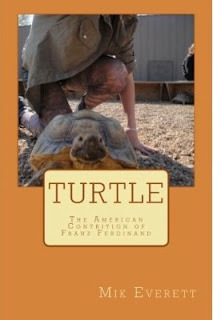 Turtle is a memoir that reads like a novel. The reader might prefer it to be fiction, because no one could wish the unfathomably dysfunctional relationships and nastily random-seeming events on any real person. Unlike a lot of books I've been reading lately, I did not want to live in the world the author so vividly paints here.
Turtle is a memoir that reads like a novel. The reader might prefer it to be fiction, because no one could wish the unfathomably dysfunctional relationships and nastily random-seeming events on any real person. Unlike a lot of books I've been reading lately, I did not want to live in the world the author so vividly paints here.As she mentions, "Squalor was the word that came to mind."
But this book does the main thing indie books alone seem to have the power to do: fly in the face of all expectations. I couldn't help but ask time and again how someone who had lived through this could come out of it with such a subtle literary touch. She manages time and again to make passages about squalor seem somehow lyrical and deeply meaningful. I also wonder how someone so young could write with so much perspective and wisdom.
So, while the subject matter could drag the reader down, by some wonderful alchemy, I felt uplifted at the end. This book actually draws the reader in to the degree that I wasn't quite ready for it end. In spite of my not having had comparable experiences, there was always some characteristic that gave the situation humanity and made me think I knew exactly what the author was talking about.
What does Franz Ferdinand have to do with anything? The poor guy didn't do much else for history than being killed. The author makes sophisticated, poetic, and startling statements about him that tie together the themes of powerlessness that run throughout the book. In the end, though, the author is not powerless because she uses her powers of perception and unique way with words to present the hand she was dealt in her own voice. In that way, she both owns her experiences and is freed from them. Unlike the supposed main character, the mother, the author can face reality without becoming emotionally dependent on any part of it. The things that happen to her don't define her. She does, if she cares to. She gets the last word.
Support this author if you're not too squeamish: paperback Kindle
Published on August 27, 2012 00:50

